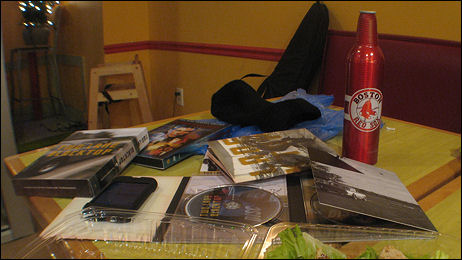“Hellyboy II” trailer
The first trailer for Guillermo del Toro ‘s Hellboy II: The Golden Army (Universal, 7.11.08), introduced by Guillermo himself. May the Gods protect this exceptional filmmaker and delightful human being from the scaly claw-clutch of Peter Jackson…please. (Thanks to UnChien for the link.)
Will Smith’s overbaked charm
According to the Times Online‘s Will Lawrence, Will Smith “is one of the most ebullient actors working today, constantly joshing and joking, the twinkle in his eye as bright as the expensive diamond studs that nestle in his ear-lobes.” This is precisely why I can’t stand the guy. He’s a salesman first and a vulnerable human being second. The more Smith gets away from joshing and joking and giving off those Scientology-loves-you smiles (which he avoids pretty well in I Am Legend), the more tolerable he becomes.
“Untraceable”
Another early ’08 dumper — Gregory Hoblit‘s Untraceable (Screen Gems, 1.25.08). You can smell it off the trailer, which reveals most of the main plot bones (apparently) except for the last half of the final act. FBI agents (Diane Lane, Colin Hanks, Billy Burke) after a serial killer who uses website hits to help perpetrate killings, and thus reminding us that we’re all vulnerable to cyber invasions. Gives every indication of having been a completely cynical paycheck job for everyone concerned.
Two-Lane Blacktop
The Criterion Collection Two-Lane Blacktop two-disc set is an absolutely beautiful thing to buy, hold, unwrap and feel cool about owning. It’s got the two DVDs with the remastered feature on one disc and several “looking back” video shorts by director Monte Hellman, plus Rudy Wurlitzer‘s original script and an essay booklet. It’s a first-class package all the way.
But the film, which I saw clear-eyed for the very first time this morning, is only a so-so-thing. It’s great and irksome, in and out, good and mundane…but certainly not an under-appreciated masterwork or the greatest road movie ever made or whatever the fans are saying.
In some ways this 1971 road poem is cool because of its lack of interest in being conventional. It’s about a couple of stock-car freaks (James Taylor, Dennis Wilson) in a ’55 Chevy making their way across the backroads in hopes of…pretty much nothing. They’re supposed to be in a big cross-country race with the owner of a GTO (Warren Oates) with the winner taking the other guy’s pink slip, but they stop racing after a while. They get to know each other, share meals, piss each other off, help each other out and generally drive around and get into minor little encounters and scrapes.
The film has a script that Esquire magazine felt was good enough to print back in ’70, but there’s no story here at all. There’s some atmosphere and aroma and a certain romance-of-the-road thing going on. I didn’t care at all about conventional beats, but I did want Hellman’s film to be mesmerizing on some level.. The truth is that it’s not. I don’t hate it. It’s diverting or moderately cool or a semi-engaging time-travel thing…whatever. But it’s not the Citizen Kane of road movies. Not by a long shot.
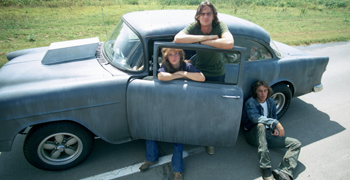
The dirty little secret of Two-Lane Blacktop (i.e., which the elite DVD critics and friends-of-Hellman will never mention) is that it doesn’t look all that great. It is often dark and muddy and lit without the slightest visual intrigue. It doesn’t begin to approach the painterly quality of a Terrence Malick film. The work by dps Jack Deerson and Gregory Sandor has a kind of funky-monkey blah feeling…like it was shot on the fly and the cheap. Laszlo Kovacs‘ lensing of Easy Rider (a low-budget road movie shot two years earlier) is much more engrossing.
So what happens in the film? The three guys compete in a lackadaisical passive- aggressive way for the affections of “the girl” (the late Laurie Bird). None of them win her over at the end. Perhaps she’s too flaky or hippie-ish to be won over…who knows? Wilson does her one night in a motel room, then seems to shine her on. Then Taylor gets interested and then more interested, and then Oates makes a play. In the end she winds up taking off with some kid on a motorcycle.
I don’t have a problem with art movies in which “nothing happens.” I’m a major admirer of Michelangelo’s Antonioni‘s L’eclisse and L’Avventura and Christopher Petit‘s Radio On. I even have a place in my head for Marguerite Duras‘s Le Camion. The problem with Two Lane Blacktop is that it’s not empty enough. In an existential vein. It toys with this and that story element and then loses interest. And then the film melts at the very end. Gimme a break.
Not empty enough, not pretty enough, not funny enough, not weird enough, not kinky enough and not crazy enough.
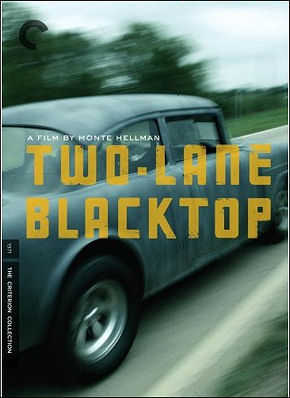
Cusack-Fendelman interview
Hollywood Chicago‘s Adam Fendelman talking recently to a subdued, almost whispery John Cusack about Grace is Gone.
Lewis on that final wham
There Will Be Blood star Daniel Day Lewis speaking to the N.Y. Observer‘s Sarah Vilkomerson about the film’s startling ending: “To me, the symmetry was absolutely right. It may be outrageous, that last scene, but to me it seemed absolutely right. I love that there’s an exuberance to it.”
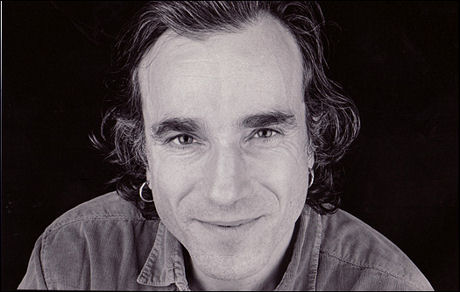
Exuburance…absolutely. But this scene wouldn’t work without that final period, that final “Day in the Life” chord, that All The President’s Men typewriter-key wham: “I’m finished.” (And no, this is nothing like a spoiler. You can say these words when you’ve finished eating or watching a film, when you’re ready to go to bed, when you’ve fucked up royally or when you’ve finally completed a great task. Context is everything.)
And this: “Paul [Thomas Anderson] thought we were making a blockbuster. I thought we were making a film that would have us sort of drummed out of town with bell, book and candle. So I feel we’re going to achieve some kind of middle ground. It’s just so great Paul thought that. I just love it: There’s no woman, no romance, no nothing — just fucking filthy guys digging holes in the ground.”
Cates projections about Oscar show
Statement #1 by Oscar show producer Gil Cates to USA Today‘s Anthony Breznican, spoken last Friday: “The only thing I can tell you without any equivocation is that the [Oscar] show is going to go on. That’s absolutely for certain.”
Cates statement #2, spoken two days ago: “It’s my fondest hope that the strike will be over by [2.24.08].
SAG nominations
The Screen Actors Guild award nominations …blah, blah. No surprises, no startling calls….everything pre-digested, pre-approved, pre-vetted. Four noms for Into the Wild — Emile Hirsch (Best Actor), Hal Holbrook (Best Supporting Actor), Catherine Keener (Best Supporting Actress) and Best Ensemble Cast. This is nonetheless the biggest uptick for Wild since the season began.
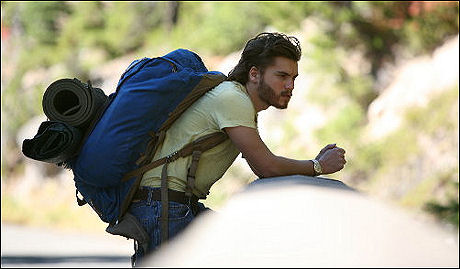
No Country for Old Men got Best Ensemble Cast plus one each for Tommy Lee Jones and Javier Bardem (Best Supporting Actor), and three Michael Clayton players were honored — George Clooney (Best Actor), Tom Wilkinson (Best Supporting Actor) and Tilda Swinton (Best Supporting Actress).
Other totally expected standout noms: Daniel Day-Lewis (Best Actor, There Will Be Blood…deserved), Cate Blanchett (Best Actress for Elizabeth: The Golden Age…c’mon!), Julie Christie (Best Actress, Away From Her), Marion Cotillard (La Vie en Rose), Angelina Jolie (Best Actress, A Mighty Heart), Ellen Page (Best Actress, Juno), Cate Blanchett (Best Supporting Actress, I’m Not There…naturally), Amy Ryan (Best Supporting Actress, Gone Baby Gone).
Del Toro and Jackson
Yesterday afternoon Entertainment Weekly‘s Missy Schwartz posted a chat with director Guillermo del Toro about the possibility of his directing the two Hobbit movies for producer Peter Jackson. Del Toro said he’s “heard some rumblings but nothing official. I don’t want to think about it because it’s such an eventuality.”

And may it go no further than that. Del Toro is way, way above Jackson’s class — his work has steadily matured, becoming cleaner, richer and more confident, with each new film. Jackson hasn’t advanced a single aesthetic notch since Braindead. He’s about two things and two things only — “look at what I can do!” and “wheeee!” He’d only cramp Del Toro’s vision and style.
The Hobbit “is the only Tolkien book I read,” Del Toro said. “I tried my best to read Lord of the Rings, the trilogy. I could not. I could not. They were very dense. And then one day, I bought The Hobbit. I read it and I loved it. So it would be a privilege. But listen, I wish I knew. At this stage, after Hellboy II, I’m unemployed!
“I met Peter and Fran [Walsh, Jackson’s life/creative partner] when we were trying to do Halo. I think what they’re doing in New Zealand is amazing. What they√ɬ¢√¢‚Äö¬¨√¢‚Äû¬¢re doing, in terms of the way they approach filmmaking — the way I see it is, it’s Hollywood the way God intended it. Because it’s a filmmaker’s dream and a filmmaker’s facility. So it’s heaven. The question is: Will I go to heaven? I have no idea.”
Schwartz says that “the idea of you and Peter Jackson working together is enough to make every geek’s head explode” and Del Toro says, “It would make my head explode! But you know, I think it’s an eventuality. I would love to, but as my agent says, ‘You’re currently unemployed.'”
Testy Little Spat
Here’s a testy little spat between The Envelope‘s Tom O’Neil and Oscar show producer Gil Cates about the possible effects of the WGA strike upon the late January Golden Globes awards and the 2.24.08 Oscar show.
“Awards shows are the best chance that writers have to prove how valuable they are,” O’Neil said in a 12.18 AP story. “Without a script, we may finally find out how vapid and empty these stars really are. The awards shows will have no choice but to go on with the show, but not the telecast.”
“That’s totally ridiculous!,” Cates replied in the same damn story. “There will absolutely be a (televised) show one way or another. There are awards to give out.” And miles to go before I sleep!
O’Neil has pointed to the radical change being planned by the January 8th Peoples’ Choice Awards, which “will present a show that the nominees and winners don’t have to attend with winners being taped ahead of time at remote locations. There will be no red carpet and arrivals. And no suspense about who wins. But there’s never been any suspense surrounding who claims the Peoples’ Choice Awards. Winners have always been tipped off ahead of time.
“Thus, it’s not a suspense-driven awards show like the Oscars, Golden Globes, Grammys and Emmys. So such a retooled show is probably not an option for the other kudos.”
O’Neil also reminds that 30 Rock writer Brett Baer said in the same AP article that the guild is aiming specifically at kudos shows, saying, ‘If we could shut down the awards shows, that would be great.’
“Mr. Cates, why do you think the Oscars will be different?”


